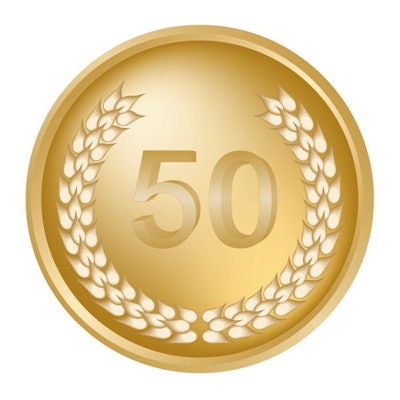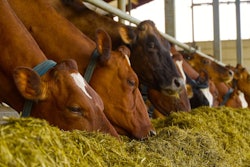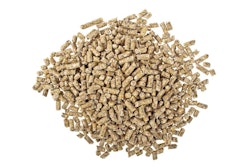
As the American Feed Industry Association celebrates the 50th anniversary of its Liquid Feed Symposium, industry veteran Cathy Bandyk, ruminant technical manager for AB Vista, looks back at the early days of the industry and ahead to the future.
PODCAST: Past, present and future of AFIA’s Liquid Feed Symposium (07:06)
Ann Reus: Hello, and welcome to the Feed Strategy podcast. I’m your host, Ann Reus, and I’m here live at the American Feed Industry Association’s Liquid Feed Symposium in Oak Brook, Illinois. I’m speaking with Cathy Bandyk, ruminant technical manager at AB Vista. Hi, Cathy.
Cathy Bandyk: Hi.
Reus: So, the American Feed Industry Association is celebrating the 50th year of its Liquid Feed Symposium this year. Can you tell me a little bit about the history of the event?
Bandyk: So, the liquid feed industry is fairly unique and, I’ll have to say, close-knit subsection of the overall feed industry and 50 years ago, they there was enough going on, enough pioneers in the industry, people experimenting with products based on molasses and other available co-products, that they scheduled a meeting just to see what would happen and they had such turnout, that they ended up starting to make it an annual event. And then the committee representing just the liquid feed industry and associated industries, such as ingredients, suppliers, equipment manufacturers, came to be established, and then it’s that committee that puts the symposium on every year.
Reus: Why do you think the symposium has continued to be so popular and valuable to the attendees?
Bandyk: I think, in part, because we are sort of a subset, right, of the greater industry with some unique challenges, unique opportunities. And we probably have all carried just a little bit of that almost underdog feeling. We had as a speaker yesterday, reflecting back on some of the early days of the industry where I think just growing pains, and some entities, maybe not having the experience or knowledge, or quality control, and we had some issues early on that live long in a farmer’s mind or, you know, in some of the influencers’ minds, and so, overcoming some of those things, running into just a lack of exposure, experience, knowledge. There’s something here that kind of brings you together, that we’re all in this together, and we need to accomplish things as a group.
Reus: And what are some of the key issues for the liquid feed industry right now?
Bandyk: Certainly, top of mind are going to be a lot of the same issues that everyone involved in animal agriculture is concerned with. We deal with, as I’m sure your audience is all well aware, with this wide range of, of either really driven individuals with specific agendas that are more concerned about their particular issue, than what I would consider the greater good, and then you’ve got a lot of them just well meaning, but misinformed people that, you know, we’ve really got a lot of concerns and issues in people’s minds that need to be positively addressed. We have great stories, we have to tell them. And so because we’re feeding livestock, we’re part of that greater story and those greater issues. But then, more specific to what we do, these are, these are ongoing challenges. We are even more so than the overall feed industry, recyclers. Almost everything, every major ingredient that goes into a liquid supplement, is a co-product of something else. That’s a wonderful sustainability story, but it can be challenging in terms of supply. You’re dependent on all these other industries in the ebb and flow of their production, or as they change processes and their co-products change, our view of those ingredients and their value is really not top of mind for any of our suppliers. And so that constant adaptation – are there new things available, has an ingredient changed, has something been priced out of or availability, limitation out of formulations. So, those are some unique things we deal with, and also, regulations in particular, say those involving medications are singularly different when we’re delivering them in a liquid rather than a dry product. So, a number of things that set us apart.
Reus: Yeah, I think those are all great points. What do you think the future holds for the industry?
Bandyk: I continue to be very enthused. While I worked directly in the liquid feed industry for almost two decades, now I work for a company that would be considered a supplier to feed manufacturers. And it’s still important to me to stay engaged with liquid feed, because I think it offers some really unique benefits that aren’t as well recognized as they deserve to be. So, I guess if you care about something like that long enough, it’s hard to let go of that. And because I do work with additives, and I’m acutely aware that liquid supplements can offer some real advantages in additive delivery. And I won’t go, that’s an entire presentation I can give, having those relationships and helping to provide some of our products through that avenue can be some of those win-wins we’re always looking for. And then, on a bigger scale, as the population grows, as overall incomes and disposable income for food increases, and I think as we as an industry do a better job of sharing our sustainability story, our nutritional story, our safety story, then demand can go nowhere but up.
Reus: Well, your passion for the industry is apparent. So, thank you for sharing some of your insights.
Bandyk: I’m happy to be here.














